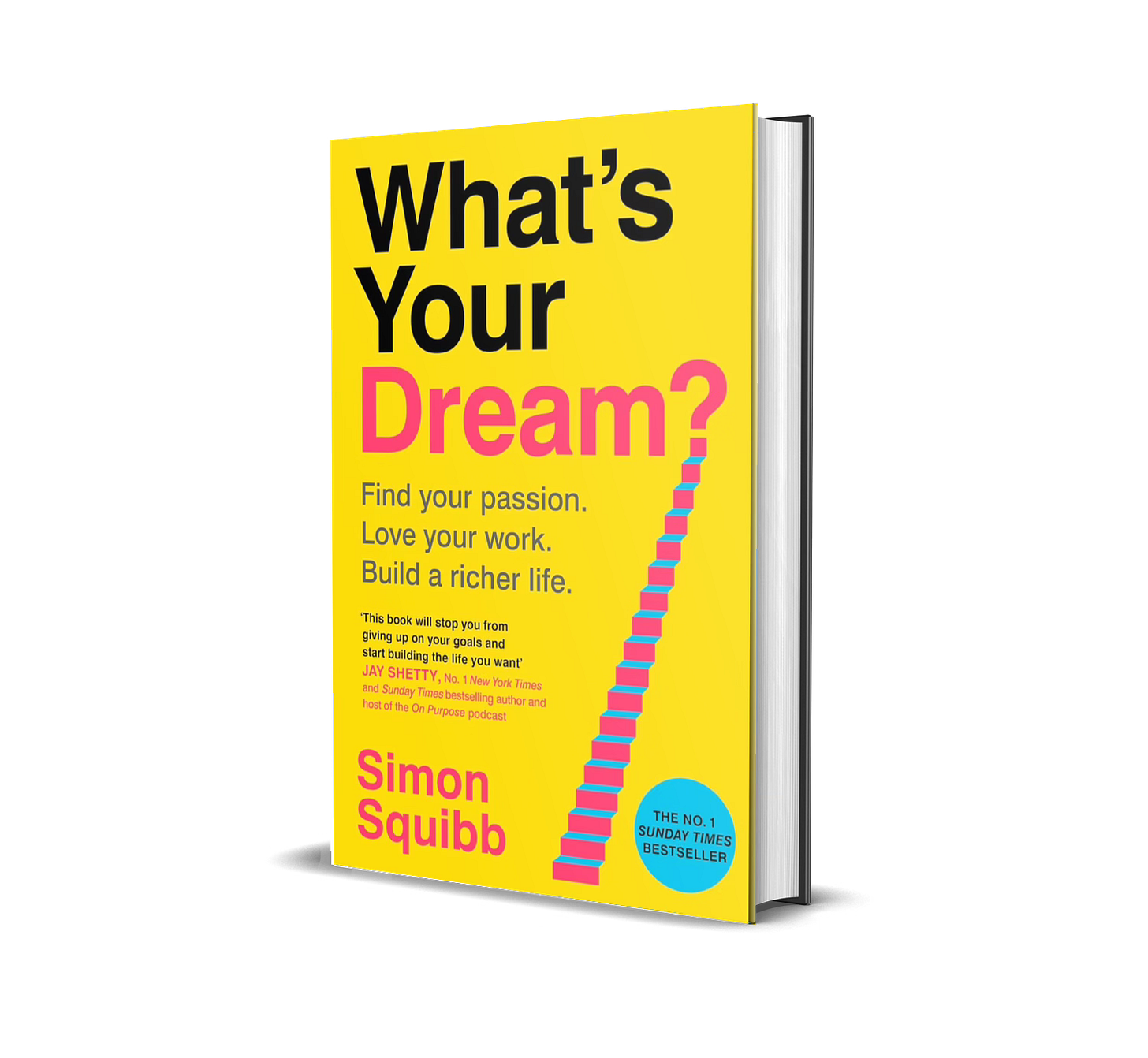The guy with the mic had a point 🎤
What I learned from Simon Squibb, the “What’s your dream?” guy
Simon Squibb isn’t your typical business guru. He’s not flogging a course. He’s not pitching a mastermind. He’s not flexing rented Lambos in Dubai.
Yet he is selling this book. But mostly, he’s giving it away. Business advice, startup tips, dream support, all of it, daily, to millions of people on the street and online.
If you’ve ever seen clips with a guy with a mic asking strangers, “What’s your dream?” it was probably him. Those TikTok clips aren’t a gimmick. They’re a philosophy.
And they’ve turned into a movement. 15 million followers. Endless videos. Every scroll, he pops up somewhere.
But here’s what stood out for me: he wasn’t just interviewing dreamers, he used to be one. Homeless at 15. Sleeping on a bench. Then years later, selling his creative agency for millions.
Now 51 and in his second (or maybe third) spotlight, his real break came when he built and sold Fluid, a Hong Kong-based creative agency, to PwC.
So when he published What’s Your Dream?: The Strategic Power of Owning Your Future in early 2025, I added it to my reading list, but I didn’t expect anything groundbreaking. But I was wrong.
It’s half memoir, half tactical guide. No ego, no magic secrets. Just the advice he wishes he had at 15. And some surprisingly sharp ideas that got under my skin.
It’s not flawless though. A few points echo familiar startup advice, but the way Squibb ties each lesson back to his own story makes it stick.
Here are the top 12 lessons I took from it 👇🏻
Millennial Masters is brought to you by Jolt ⚡️ The UK’s top web hosting service
Simon Squibb’s startup playbook
1️⃣ Ditch the success myths
Society loves to tell us what “success” requires: long hours, zero mistakes, and playing it safe. Squibb calls nonsense on all that. Myths like “never fail” or “work till you drop” will kill your dream if you believe them.
He learned young that following others’ rules (school, corporate ladder) doesn’t guarantee anything. The lesson: question those so-called rules. Unlearn the junk notions that hold you back, so you can forge your own path.
2️⃣ Purpose powers the dream
“What’s your why?” might sound like a cliché, but Squibb shows it’s serious fuel. When you marry a dream with a clear purpose, it can change your life. After crawling out of homelessness, his own drive came from a mission bigger than just making money.
One tip he offers: keep trying different ways of helping people until one gives you a warm glow inside. That warm feeling is a sign you’ve found a real purpose. Founders who anchor their startup to a mission (not just a product) have the fire to push through the tough times.
3️⃣ Ask the big three
Stuck figuring out what your dream even is? Squibb suggests asking yourself three key questions: What do you love to do? What pain have you lived through? And how can you help others? The sweet spot for a meaningful venture is where those answers overlap.
For example, he tells the story of an entrepreneur who couldn’t find comfortable jeans after a medical ordeal, so she started a denim brand to help patients like her. Your own dream is probably hiding in your hobbies, your hardships, or the problems you can solve for others.
4️⃣ Don’t let money cage you
A fat salary or big mortgage can become a trap that kills your ambition. If you’re selling all your time to pay bills, you’ve built yourself a cage. Squibb argues a possession should never be your dream. In other words, don’t chase stuff that locks you into a grind you hate.
Instead, aim for financial freedom. Live lean, cut the fluff from your expenses, and build assets or a business that doesn’t require trading hours for dollars. The less you’re enslaved by bills, the freer you are to pursue your real vision.
5️⃣ Master your mindset
If you don’t get your head straight, you’re done before you start. Squibb treats failure as painful but priceless tuition for success. Instead of avoiding hard or scary tasks, he attacks them and suggests you do the same.
Every setback is just another lesson. This growth mindset builds the resilience every entrepreneur needs to survive the punches. You have to believe you can learn and adapt, or you’ll crack at the first real test. Train your brain to see opportunity where others see defeat.
6️⃣ Prepare, then pounce
Chasing a dream isn’t about quitting your day job tomorrow with zero plan. Squibb uses a “build a boat” analogy: do your prep before you set sail. Gain skills, save some cash, make contacts. In short, set yourself up so you won’t sink the minute you leap.
But once you’ve built that boat, you do have to jump. One founder he mentions offered her services for free at a big event just to get her foot in the door; it worked because she was ready. The takeaway: preparation is power, but eventually you must act.
7️⃣ Start lean, stay scrappy
When it comes to funding, less can be more. Starting a business with limited cash forces you to focus and get creative. Squibb learned this the hard way after one of his ventures burned through a pile of investor money for nothing.
Now he preaches the upside of constraints. Be frugal, prioritise essentials, and make profitability a priority from day one. By building on real revenue (not hype), you create a business that can weather the storms. Remember, scrappy beats flashy.
8️⃣ Build your dream team
No great business is built alone, and Squibb makes that clear. Your success will hinge on the people you bring along. He hires and partners based on values and passion, not just CVs. (In fact, he gives job candidates a “Madoff test,” an ethics scenario to see if they’ll put integrity over profit.)
The lesson: surround yourself with believers and doers who share your mission. The right team will propel your dream forward; the wrong people will sink it fast.
9️⃣ Flex your risk muscle
Playing it safe never built anything great. Squibb urges founders to systematically push beyond their comfort zone. He even bent the rules with a guerrilla marketing stunt for one startup, a calculated risk that scored huge publicity.
The point: risk is part of the game. Take small bets often to build your risk tolerance, like exercising a muscle. Whether it’s launching a bold campaign or pursuing an unconventional idea, you won’t break new ground without taking chances. The more you risk (smartly), the more you stand to gain.
🔟 Never stop, no matter what
The only sure way to fail is to quit. Squibb doesn’t mince words: persistence is everything. He highlights how even giants like Nvidia nearly went bust before they became industry leaders. They survived only because they refused to give up.
Every founder hits walls, from product flops to personal crises. Squibb’s advice: treat setbacks as steps, not stop signs. If you truly believe in your dream, you owe it that level of grit. Keep moving, adjust the plan, but don’t ever give up on the goal.
1️⃣1️⃣ Step back, cash out, move on (without regrets)
Squibb sold his businesses twice. First, Fluid, the Hong Kong agency he built from scratch, which PwC acquired after years of relationship-building. Then his investment firm, Nest, via a management buyout. But he confessed he sometimes wishes he’d held on longer. Selling meant rebuilding all over again: a three-year climb to get back the team and freedom he’d once had.
His real insight? You should never “look” to sell. Get good enough that buyers find you. And when they do, don’t let your ego write the cheque. Be sure it’s the right time, the right people, and the right reason to walk away.
If you’re scaling something real, start stepping away in stages. Hire better than you. Remove yourself from day-to-day. Then, if an offer lands, evaluate it with brutal clarity: does it serve your people, your values, and your future freedom? Not just your bank account. Ownership is leverage, but letting go, done right, is power too.
💡What Simon Squibb taught me about starting over, on my own terms
Squibb’s advice in What’s Your Dream? isn’t polished or packaged. It’s lived. Some of it is hard, some of it’s messy, but all of it comes from someone who’s actually built, sold, and started again.
You don’t have to nod along to every line. But there’s something grounding in Squibb’s core message: you don’t need to have it all figured out before you start. You just need conviction, scrappiness, and the guts to ask for help early.
If you’re building something, especially without a safety net, this book won’t tell you what to do. It’ll remind you why you started. And maybe that’s what you need most.
You’re allowed to dream. You’re allowed to make it up as you go.
Just don’t sit still.
More Booksmart wisdom from Millennial Masters:
The no-BS guide to winning: 25 key principles to live by 🔥
Your roadmap to building a life on your own terms from Just the Good Stuff by Jim VandeHei







Sounds great! Sounds very attractive. Sounds...like I need to be on the defensive. Did he pay himself the same as his colleagues? 🤔